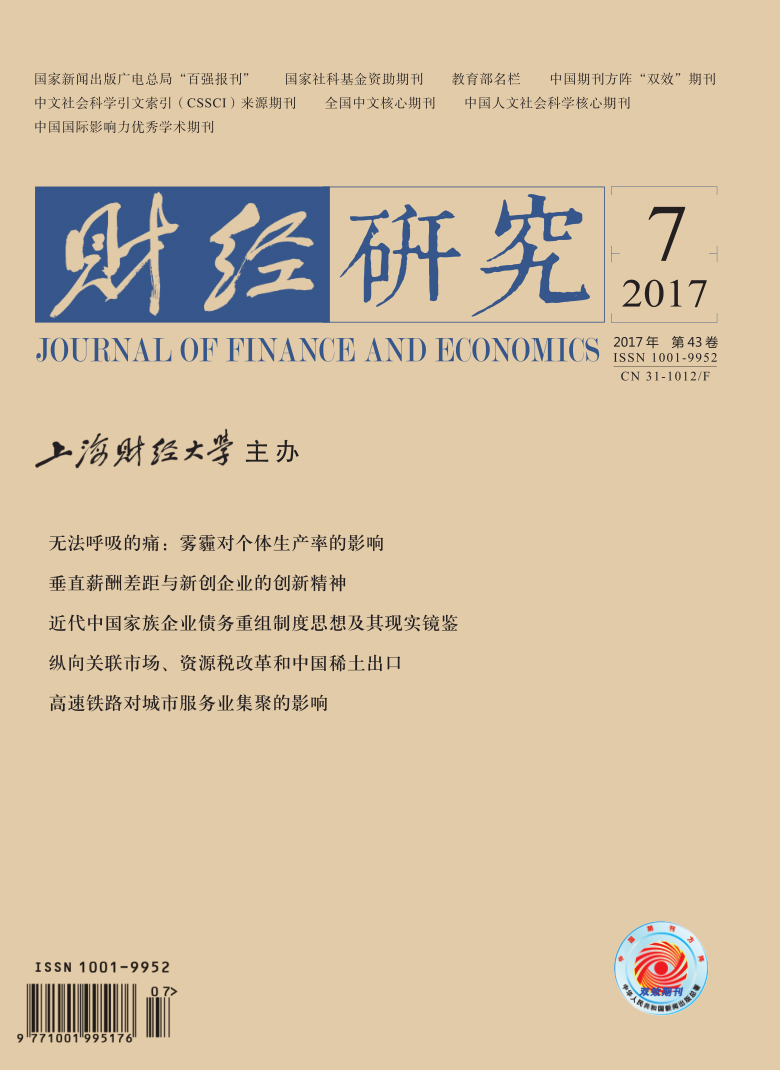证券分析师是否会为了商业性目的而牺牲专业性?文章利用融资融券制度检验了鼓励交易动机是否会导致分析师有意提供偏颇的股票分析报告。卖空交易使股票在下跌过程中也能增加交易佣金,促使证券分析师给出更加客观的盈余预测。文章采用经过股票价格调整的盈余预测误差绝对值,作为分析师盈余预测偏差的度量指标,发现相对于存在卖空限制的股票,分析师对融资融券标的股票的短期盈余预测偏差降低了约0.014,长期盈余预测偏差降低了约0.019,但平均月度换手率上升了约10.9%。公司业绩和盈余预测难度的变化不能解释这一现象。文章研究表明,鼓励交易动机会使分析师发布更加乐观的盈余预测报告,而允许卖空有助于矫正这种商业性动机,增强分析师的专业性。
分析师商业性动机与盈余预测偏差:来自融资融券的证据
摘要
参考文献
2 李科, 徐龙炳, 朱伟骅.卖空限制与股票错误定价——融资融券制度的证据[J].经济研究, 2014, (10):165-178. DOI:10.3969/j.issn.1005-913X.2014.10.102
7 Abarbanell J S, Bernard V L. Tests of analysts' overreaction:Underreaction to earnings information as an explanation for anomalous stock price behavior[J]. Journal of Finance, 1992, 47(3):1181-1207. DOI:10.1111/j.1540-6261.1992.tb04010.x
8 Brown L D. How important is past analyst forecast accuracy?[J]. Financial Analysts Journal, 2001, 57(6):44-49. DOI:10.2469/faj.v57.n6.2492
9 Chopra V K. Why so much error in analysts'earnings forecasts?[J]. Financial Analysts Journal, 1998, 54(6):35-42. DOI:10.2469/faj.v54.n6.2223
10 Clement M B. Analyst forecast accuracy:Do ability, resources, and portfolio complexity matter?[J]. Journal of Accounting and Economics, 1999, 27(3):285-303. DOI:10.1016/S0165-4101(99)00013-0
11 Cowen A, Groysberg B, Healy P. Which types of analyst firms are more optimistic?[J]. Journal of Accounting and Economics, 2006, 41(1-2):119-146. DOI:10.1016/j.jacceco.2005.09.001
12 Crichfield T, Dyckman T, Lakonishok J. An evaluation of security analysts' forecasts[J]. The Accoun-ting Review, 1978, 53(3):651-668.
13 Das S, Guo R J, Zhang H. Analysts' selective coverage and subsequent performance of newly public firms[J]. Journal of Finance, 2006, 61(3):1159-1185. DOI:10.1111/j.1540-6261.2006.00869.x
14 Das S, Levine C B, Sivaramakrishnan K. Earnings predictability and bias in analysts' earnings forecasts[J].The Accounting Review, 1998, 73(2):277-294.
16 Dechow P M, Hutton A P, Sloan R G. The relation between analysts' forecasts of long-term earnings growth and stock price performance following equity offerings[J]. Contemporary Accounting Research, 2000, 17(1):1-32. DOI:10.1111/(ISSN)1911-3846
17 Dowen R J. Analyst reaction to negative earnings for large well-known firms:Systematic differences for negative and non-negative earnings firms[J]. Journal of Portfolio Management, 1996, 23(1):49-55. DOI:10.3905/jpm.1996.409572
18 Dugar A, Nathan S. The effect of investment banking relationships on financial analysts' earnings forecasts and investment recommendations[J]. Contemporary Accounting Research, 1995, 12(1):131-160. DOI:10.1111/(ISSN)1911-3846
19 Easterwood J C, Nutt S R. Inefficiency in analysts' earnings forecasts:Systematic misreaction or systematic optimism?[J]. Journal of Finance, 1999, 54(5):1777-1797. DOI:10.1111/0022-1082.00166
20 Friesen G, Weller P A. Quantifying cognitive biases in analyst earnings forecasts[J]. Journal of Financial Markets, 2006, 9(4):333-365. DOI:10.1016/j.finmar.2006.07.001
21 Hayes R M. The impact of trading commission incentives on analysts' stock coverage decisions and earnings forecasts[J]. Journal of Accounting Research, 1998, 36(2):299-320. DOI:10.2307/2491479
22 Hong H, Kubik J D. Analyzing the analysts:Career concerns and biased earnings forecasts[J]. Journal of Finance, 2003, 58(1):313-351. DOI:10.1111/1540-6261.00526
23 Irvine P J. Analysts' forecasts and brokerage-firm trading[J]. The Accounting Review, 2004, 79(1):125-149. DOI:10.2308/accr.2004.79.1.125
24 Jackson A R. Trade generation, reputation, and sell-side analysts[J]. Journal of Finance, 2005, 60(2):673-717. DOI:10.1111/j.1540-6261.2005.00743.x
25 Jacob J, Lys T Z, Neale M A. Expertise in forecasting performance of security analysts[J]. Journal of Accounting and Economics, 1999, 28(1):51-82. DOI:10.1016/S0165-4101(99)00016-6
26 Lim T. Rationality and analysts' forecast bias[J]. Journal of Finance, 2001, 56(1):369-385. DOI:10.1111/0022-1082.00329
27 Lin H, McNichols M F. Underwriting relationships, analysts' earnings forecasts and investment recommendations[J]. Journal of Accounting and Economics, 1998, 25(1):101-127. DOI:10.1016/S0165-4101(98)00016-0
29 Michaely R, Womack K L. Conflict of interest and the credibility of underwriter analyst recommendations[J]. Review of Financial Studies, 1999, 12(4):653-686. DOI:10.1093/rfs/12.4.653
30 Mikhail M B, Walther B R, Willis R H. Do security analysts improve their performance with experience?[J]. Journal of Accounting Research, 1997, 35:131-157. DOI:10.2307/2491458
31 Quan Y, Liang S. Is forecast capability important? Evidence from the selection of best analysts in China[J]. China Accounting and Finance Review, 2015, 17(4):10-42. DOI:10.7603/s40570-015-0010-1
32 Rajan R, Servaes H. Analyst following of initial public offerings[J]. Journal of Finance, 1997, 52(2):507-529. DOI:10.1111/j.1540-6261.1997.tb04811.x
33 Sedor L M. An explanation for unintentional optimism in analysts' earnings forecasts[J]. The Accoun-ting Review, 2002, 77(4):731-753. DOI:10.2308/accr.2002.77.4.731
引用本文
胡凡, 夏翊. 分析师商业性动机与盈余预测偏差:来自融资融券的证据[J]. 财经研究, 2017, 43(7): 45–56.
导出参考文献,格式为:
上一篇:垂直薪酬差距与新创企业的创新精神






 9316
9316  7937
7937

